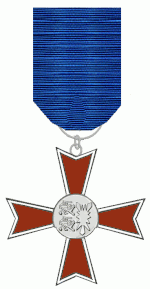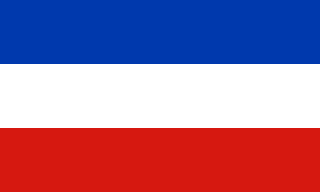
Schleswig-Holstein is the northernmost of the 16 states of Germany, comprising most of the historical Duchy of Holstein and the southern part of the former Duchy of Schleswig. Its capital city is Kiel; other notable cities are Lübeck and Flensburg.

Dithmarschen is a district in Schleswig-Holstein, Germany. It is bounded by the districts of Nordfriesland, Schleswig-Flensburg, Rendsburg-Eckernförde, and Steinburg, by the state of Lower Saxony, and by the North Sea. From the 13th century up to 1559 Dithmarschen was an independent peasant republic within the Holy Roman Empire and a member of the Hanseatic League.
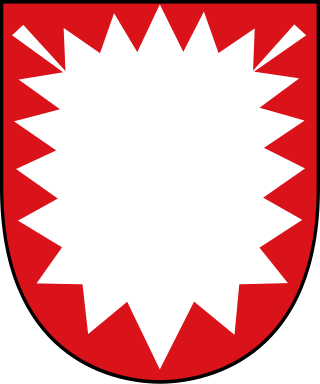
Holstein is the region between the rivers Elbe and Eider. It is the southern half of Schleswig-Holstein, the northernmost state of Germany.

The Order of Merit of the Federal Republic of Germany is the only federal decoration of Germany. It is awarded for special achievements in political, economic, cultural, intellectual or honorary fields. It was created by the first President of the Federal Republic of Germany, Theodor Heuss, on 7 September 1951. Colloquially, the decorations of the different classes of the Order are also known as the Federal Cross of Merit.
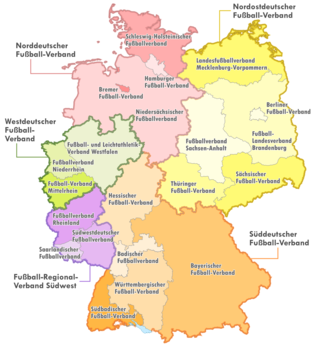
The Oberliga is the fifth tier of the German football league system. Before the introduction of the 3. Liga in 2008, it was the fourth tier. At the end of the 2011–12 season the number of Oberligas was increased from eleven to fourteen.
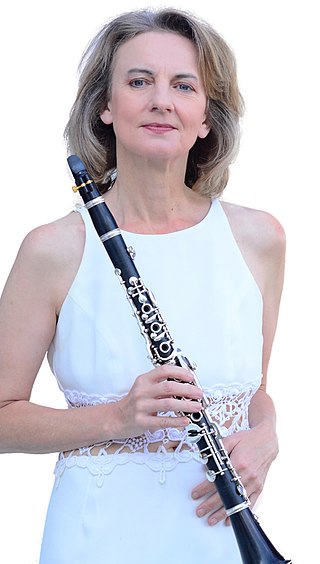
Sabine Meyer is a German classical clarinetist.

The House and Merit Order of Duke Peter Frederick Louis or proper German Oldenburg House and Merit Order of Duke Peter Frederick Louis was a civil and military order of the Grand Duchy of Oldenburg, a member state of the German Empire. The order was founded by Grand Duke Augustus of Oldenburg on 27 November 1838, to honor his father, Peter Frederick Louis of Oldenburg. It became obsolete in 1918 after the abdication of the last grand duke.

Francis II of Saxe-Lauenburg, was the third son of Francis I of Saxe-Lauenburg and Sybille of Saxe-Freiberg, daughter of Duke Henry IV the Pious of Saxony. From 1581 on he ruled Saxe-Lauenburg as duke.
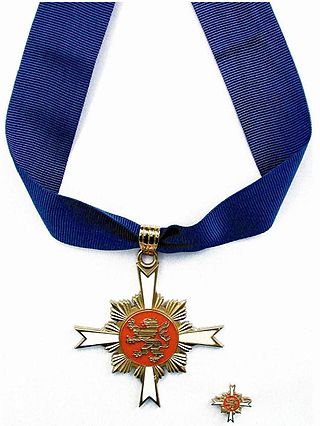
The Hessian Order of Merit is a civil order of merit, and the highest award of the German State of Hesse. The order was established 1 December 1989.

Order of Merit of Baden-Württemberg is the highest award of the German State of Baden-Württemberg. Established 26 November 1974, it was originally called the Medal of Merit of Baden-Württemberg. Effective 26 June 2009, the medal assumed its current name. The order is awarded by the Minister-President of Baden-Württemberg for outstanding contributions to the state of Baden-Württemberg, in politics, society, culture and economics. The order is limited to 1,000 living holders, and has been awarded 1,923 times, as of 30 April 2018.

The Order of Merit of Berlin is this highest award of the German State of Berlin. Awarded in the name of the Senate of Berlin, the order had recognized outstanding contributions to the State of Berlin since 21 July 1987. Awarded each year on 1 October, the anniversary of the Berlin Constitution, the order is limited to no more than 400 living recipients. As of 2016 the order had been awarded 431 times, to 152 women and 279 men.

The Order of Merit of Mecklenburg-Vorpommern is a civil order of merit, and the highest award of the German State of Mecklenburg-Vorpommern. The award is presented to men and women for exceptional performance over a long period of time, or an extraordinary individual performance for the benefit of Mecklenburg-Vorpommern. Founded in 2001 and first presented in 2002, the order may be presented to up to 20 persons per year.

The Lower Saxony Order of Merit is a civil order of merit, of the German State of Lower Saxony. The order was established 27 March 1961. The order is presented in three classes, the highest is the Grand Cross of Merit, the next is the Cross of Merit First Class, and the lowest is the Cross of Merit on Ribbon.

The Order of Merit of North Rhine-Westphalia is a civil order of merit, of the German State of North Rhine-Westphalia. The Order of Merit of North Rhine-Westphalia was founded on 11 March 1986. It is awarded to citizens representing all segments of the population who have made extraordinary contributions to the people and state of North Rhine-Westphalia. The order is limited to 2500 living recipients. From its founding through January 2010, a total of 1,559 people have been awarded the Order of Merit of North Rhine-Westphalia.

The Order of Merit of Rhineland-Palatinate is a civil order of merit, of the German State of Rhineland-Palatinate. The order is presented for outstanding service to the state and people of Rhineland-Palatinate. It was founded on 2 October 1981, and first awarded in 1982. The order is limited to 800 living recipients. Through 2012, the order had been awarded 1035 times.

The Order of Merit of the Free State of Saxony is a civil order of merit, and the highest award of the German state of Saxony. First presented in 1997, it is awarded by the Minister-President of Saxony. The order is presented to individuals who have made outstanding contributions to the people and state of Saxony. The award is limited to a total of 500 living recipients. As of October 2020, it has been awarded 349 times.

The Order of Merit of Saxony-Anhalt is the highest award of the German State of Saxony-Anhalt. Established 23 May 2006, the order is presented by the Minister-President of Saxony-Anhalt. The total number of living recipients is limited to 300. Recipients of the order are recognized for exceptional performance over a longer period of time or an extraordinary individual performance for Saxony-Anhalt and its citizens. Individuals are considered from among the citizens and non-citizens of Saxony-Anhalt.
The orders, decorations, and medals of the German states, in which each states of Germany has devised a system of orders and awards to honour residents for actions or deeds that benefit their local community or state, are in turn subsumed within the German honours system. Each state sets their own rules and criteria on eligibility and also how each medal is awarded and presented. Most of the orders allow for the recipient to wear their orders in public.

Patrick Breyer is a German digital rights activist, jurist, Pirate Party Germany politician, and – since 2019 – Member of the European Parliament (MEP). From 2012 to 2017 he was a member of the state parliament of Schleswig-Holstein and from April 2016 until the end of the legislative period he was also the leader of the Pirate group in that assembly. Breyer is one of four European Pirate Party MEPs in the 2019–2024 term along with three Czech Pirate Party members, all of whom are members of the Greens / EFA parliamentary group.

Otto Eisenmann was a German politician of the Free Democratic Party (FDP) and former member of the German Bundestag.
